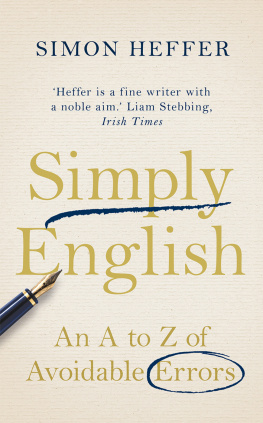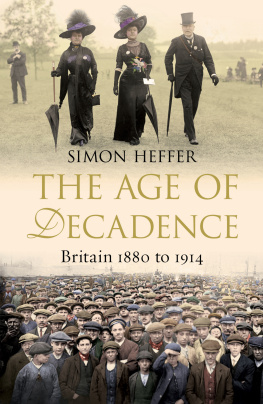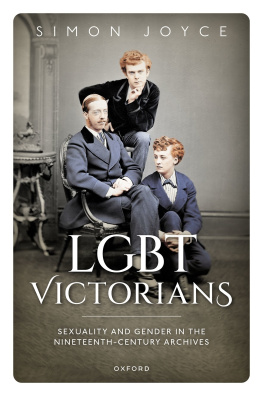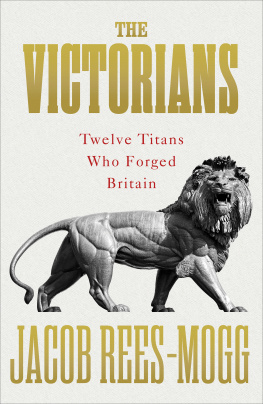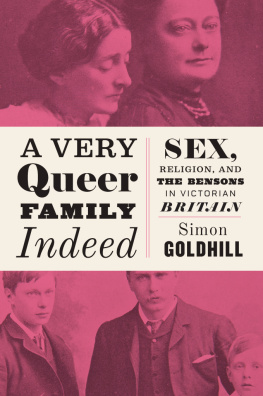CONTENTS
About the Book
Britain in the 1840s was a country wracked by poverty, unrest and uncertainty, where there were attempts to assassinate the Queen and her prime minister, and the ruling class lived in fear of riot and revolution. By the 1880s it was a confident nation of progress and prosperity, transformed not just by industrialisation but by new attitudes to politics, education, women and the working class. That it should have changed so radically was very largely the work of an astonishingly dynamic and high-minded group of people politicians and philanthropists, writers and thinkers who in a matter of decades fundamentally remade the country, its institutions and its mindset, and laid the foundations for modern society.
Simon Heffers major new book explores this process of transformation. It traces the evolution of British democracy. It shows how early laissez-faire attitudes to the lot of the less fortunate turned into campaigns to improve their lives and prospects. It analyses the birth of new attitudes to education, religion and science. And it shows how even such aesthetic issues as taste in architecture were swept in to broader debates about the direction that the country should take. In the process, Simon Heffer looks at the lives and deeds of major politicians, from the devout and principled Gladstone to the unscrupulous Disraeli; at the intellectual arguments that raged among writers and thinkers such as Matthew Arnold, Thomas Carlyle and Samuel Butler; and at the great projects of the age, from the Great Exhibition to the Albert Memorial. Drawing heavily on previously unpublished documents, he offers a superbly nuanced insight into life in an extraordinary era, populated by extraordinary people and how our forebears pursuit of perfection gave birth to modern Britain.
About the Author
Simon Heffer was born in 1960. He read English at Cambridge and took a PhD at that university in modern history. His previous books include: Moral Desperado: A Life of Thomas Carlyle, Like the Roman: The Life of Enoch Powell, Nor Shall My Sword: The Reinvention of England, Vaughan Williams, the highly successful Strictly English and A Short History of Power. In a career of nearly 30 years in Fleet Street he has written columns for and held senior positions on the Daily Mail, The Daily Telegraph and The Spectator.
High Minds
The Victorians and the Birth of Modern Britain
Simon Heffer

To Mark Jones, in admiration and with gratitude
Estote ergo vos perfecti!
Matthew 5:48, quoted from the Vulgate
by Matthew Arnold, Culture and Anarchy
Fired with the great spirit of the nineteenth century at least with that one which is vulgarly considered its especial glory he resolved to make haste to be rich.
Charles Kingsley, Alton Locke (p. 112)
But is it indeed an error to suppose mankind capable of great improvement? And is it really a mark of wisdom to deride all grand schemes of human amelioration as visionary?
J. S. Mill, speech on perfectibility, 2 May 1828
Do you mean to build as Christians or as infidels?
John Ruskin, The Crown of Wild Olive (p. 88)
In a progressive country change is constant: and the great question is not whether you should resist change which is inevitable, but whether that change should be carried out in deference to the manners, the customs, the laws, and the traditions of a people, or whether it should be carried out in deference to abstract principles, and arbitrary and general doctrines. The one is a national system; the other, to give it an epithet, a noble epithet which it may perhaps deserve is a philosophic system.
Benjamin Disraeli, speech at Edinburgh, November 1867
This question is no longer a religious question, it has become a political one. It is indeed the question of questions; it has become paramount to every other question that has been brought before us. From the moment that you intrust the masses with power their education becomes an absolute necessity.
Robert Lowe, speech on the Third Reading of the Reform Bill, House of Commons, 15 July 1867
Quand on fait des omelettes il faut croquer des oeufs.
Samuel Butler, unused epigraph for The Way of All Flesh
And not by eastern windows only,
When daylight comes, comes in the light;
In front the sun climbs slow, how slowly,
But westward, look, the land is bright.
Arthur Hugh Clough, Say Not, the Struggle Naught Availeth
ACKNOWLEDGEMENTS
Extracts from the papers of Prince Albert, the Prince Consort, in the Royal Archives have been used by gracious permission of Her Majesty the Queen. I am also indebted to Miss Pamela Clark of the Royal Archives, and her colleagues, for their help. Dr Owen Walton was also extremely helpful in pointing me to certain key areas of research. I am grateful to the staff of the British Library for access to a number of manuscript collections there, notably the papers of W. E. Gladstone, Sir Robert Peel and Florence Nightingale, among many others. Mr Frank Bowles and Mr John Wells in the Manuscript Department of the Cambridge University Library also gave great assistance, as did other of their colleagues. I am particularly grateful to Matheson and Co for permission to quote matter relating to Sir James Fitzjames Stephen from the Parkes papers in the Cambridge University Library. Reproductions of paintings by Samuel Butler, and quotations from the Samuel Butler Collection, appear by kind permission of the Master and Fellows of St Johns College, Cambridge. I should particularly like to thank Mrs Kathryn McKee and Miss Rebecca Watts for their help in using the Collections at St Johns. Royal Holloway, University of London, gave me access to the papers of Thomas Holloway and to material concerning the foundation of Bedford College, and I am grateful to the college and to Vicky Holmes for the help she gave me with those collections. I must thank Imperial College, University of London, for access to the archive of the 1851 Commission, and to Angela Kenny for facilitating it. Jacky Cowdrey guided me through the archives of the Royal Albert Hall, for which I thank her. Sue Sturrock helped me with an enquiry at the Royal College of Music, and I am also most grateful to Miss Laura Ponsonby for allowing me to see the archive of Sir C. Hubert H. Parry, and for her hospitality when I visited it.
Modern authors owe a considerable debt to those who have ensured that many primary sources are now available online. Millbank Systems, who have made more than 200 years of Hansard available, merit my particular gratitude.
Mrs Pat Ventre and Mr Gavin Fuller helped find some material for me, for which I thank them. I am also grateful to Mr Murdoch MacLennan, Chief Executive of Telegraph Media Group, for granting me the sabbatical from my duties on that newspaper during which I began the research for this book, and to the Master and Fellows of Corpus Christi College, Cambridge, for allowing me to lodge with them for the year in which that work started.
Dr Frank Prochaska gave me much useful advice and pointed me towards much useful material about the mid-nineteenth century. The Revd Mark Jones, the Revd John Witheridge and Dr Karina Urbach all did me the inestimable service of reading the manuscript, for which I thank them profusely. I am grateful to Mr Fergus Shanahan for reading the proofs at a late stage.
I was guided towards returning to the subject of the Victorians by my agent, Georgina Capel, whose support throughout this process, from conception to birth, has been magnificent. I am deeply grateful to my publisher at Random House, Nigel Wilcockson, not just for his tolerance and forbearance during the production of this book, and his insightful suggestions about its structure, but also for his intelligence and expertise on its subject matter which made my job as author far easier than it might otherwise have been. The book was superbly copy-edited by Mary Chamberlain and indexed by Kate Faulkner.
Next page

